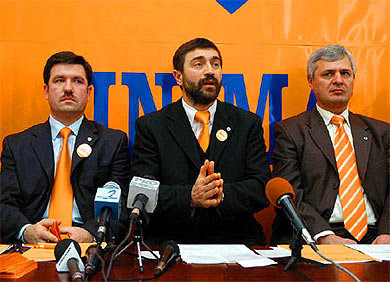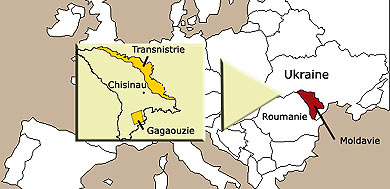Everything is ready in Chisinau (the capital city of Moldavia, a former Soviet Republic) to welcome the "orange revolution" on March 6, on the legislative elections. But yet it is not crystal clear just how the Christian/Democrats followers of Yuri Rosca could represent a radical change or a rupture with the present communist government of Vladimir Voronin. The latter, for quite a long time now, has been marching through the path of liberalism and of US interests. Most probably Vladimir Putin, at the recent summit meeting held in Bratislava with George W. Bush, indicated the latter that there is no need to abuse in the use of symbols and that he is holding in his hand the card of Transnistria.

Moldavians are summoned to cast their votes on March 6, 2005 to select their new Parliament. Whatever the result of the voting might be, the country shall not modify the Western orientation it is following. In fact, the three main contending parties favor the integration to the European Union. Nevertheless, the United States may be tempted to exert influence in the course of the events to eliminate political figures that emerged from the past Soviet system with whom they have been cooperating until these days. After the "orange revolution" in Ukraine and after the victory of liberals in Romania, the area, as a whole shall express their adherence to the Western system.
As of last month, the leaders of the Christian/Democrat Popular Party (the former Popular Front) have adopted the orange color in their publicity campaigns. In their leaflets one can see their President, Yuri Rosca, posing next to the new Ukrainian President, Viktor Yuschenko, and people refers to the "orange epidemic".
The Christian/democrats have already announced, at a very well staged scenario, that voting will be manipulated by those holding power and that they shall acknowledge its results.
But, why launching such an operation, when the Communist Party in power has already changed its position for quite a long time and when President Vladimir Voronin only has eyes for Washington? What really happens is that the State Department wishes to speed up the integration process to the European Union, in spite of the touchy issue of Transnistria, entailing the risk of secession by the Russian-speaking citizens.

Moldavia is a small State (a former Soviet Republic) with around 4.5 million inhabitants. It has no power or mining resources, so it can only count with its agriculture and its inhabitants face the lower living standards in Europe. Historically a part of Romania, Moldavia, was annexed to the Soviet Union during World War II. The language spoken there is Romanian, with the exception of a long strip East to the Dniester River (Transnistria) and a small area to the South (Gagauzia), where they speak Russian and Ukrainian.
In 1989, when Mijail Gorbatchov has just been elected Head of State and he was starting to question the functioning inherited from Stalin, 400,000 Moldavians took the streets in the capital city (then called Kishinev at present Chisinau) to demand its annexation to Romania. The then Romanian President, Nicolae Ceausescu, very happy with this gift from heaven, revoked the Agreement of 1940 and stated he was ready for reunification. Almost immediately he was overthrown by a «revolution» wisely orchestrated by the Russian and American services acting in unison and whose symbol is, still at present, the "Timisoara ossuary".
Lastly, in June 1990, Moldavia unilaterally proclaimed its independence contrary to the opinion of the Gagauzians and of the 700 000 Transnitrians. Playing deaf ears to all these, Mijail Gorbatchov launched an ultimatum to local authorities and threatened with the use of force. After facing the effects of several problems and when the USSR has already started its disintegration process, Moscow accepted granting independence to Moldavia, upon the condition it will integrate to the Community of Independent States. Aware of the fact that a link with Romania will not mean a significant contribution and could result in the disintegration of its own country, the Moldavians renounced to this project through the holding of a referendum.
Although the problem of Gagauzia was solved through an autonomy status, the one of Transnitria has worsened. Russia intervened in 1992 to protect the Russian-speaking population, and it deployed the 14th Army. This military force under the command of General Alexandre Lebed, implemented its own policy, not always linked to the Kremlin. In spite of the fact that at present the Russian troops have decreased from 10 000 to 2 500, still they are there, because of a bilateral agreement. Under its protection, Trasnistria has proclaimed its independence and has attained a perfect organization. Until now, Russia that had privileged links with Ukraine has not stated any strategic interest on it. Basically it was more in the nature of a sentimental link that proved to be an excellent hint for Anglo-Saxons, always interested in supporting separatist movements in Russia.
In the period between November and December 2004, the Anglo-Saxons took control over Ukraine for the benefit of the "orange revolution". The Russian troops stationed in Transnitria are isolated from their headquarters. Considering it was time to get rid of them to fall into the arms of NATO, Andrei Satran, the Foreign Minister of Moldavia, filed a complain at the OSCE stating that these troops «are illegally occupying the Moldavian territory»; something considered by the Kremlin as «absurd, irresponsible and non-friendly objectives», while citing the bilateral agreement and recalling the fact that they are supplying energy to Moldavia at a low price.
It seems that all these is a maneuver on the part of the White House to gain grounds under the believe that Russia, unable to react in Kiev, will do the same regarding Tiraspol. In fact, President Vladimir V. Putin, who on February 24, 2004 met with President George W. Bush in Bratislava, will set boundaries that shall not be trespassed. Moscow, could decide supporting the Russian-speaking Ukrainians, who massively voted against Viktor Yuschenko, fostering them to get close to the citizesn of Transnistria to demand, in unison, its annexation to Russia.
Based on this, Washington has been asked twice to think about this issue prior to launching the "orange revolution" in Chisinau. The Communist Party, in 2001, proved its superiority in legislative elections and Vladimir Voronin became at that time, the first communist president democratically elected. Contrary to its brother parties in Central and Oriental Europe, the Moldavian Communist Party has kept its name rather than changing it to produce a virginal halo. Nevertheless, it has not hesitated in changing its course. Abandoning its social policy, it is so America biased that it supported Iraq’s invasion and defied Russia at the international arena. According to all surveys, it shall again obtain a sound victory this time.

Many hopes and eyes are centered in the "Democratic Moldavia Coalition", created this last summer which groups several parties ranging from center-left (whose emblematic color is lemon-green) to the classic right. A special place is held by the Social Liberal Party, the Democratic Party, the Braghis Alliance (named after its main leader). This coalition headed by Serafim Urechean, Major of the Moldavian capital, has a strong presence in the cities, especially in Chisinau. It is less known in the rural areas, that favor local communists and that have a well-organized network.
The other relatively important opposition party is the Christian-Democrat Popular Party, with a strong right-wing position, who accessed the Parliament four years ago, but with only 11 deputies it does not represent a real force against 71 communist deputies and 19 from the central-left alliance. In spite of its electoral program, rather obscure and with scarce winning possibilities, its leader, Yuri Rosca, has already reserved the central place in the capital for over two weeks starting on March 7, with the hope of repeating the Kiev coup. He is already surrounded by NED teams, of the Freedom House and Fondation Soros, but it has turned difficult for him to explain how can he represent a profound political change with the actual government.
If the elections in Ukraine geographically divided the country into West and East, those in Moldavia tend to divide the country between cities and countryside. The difficult economic situation experimented in the country for almost a decade has compelled almost one million Moldavians to abandon the country. The rural areas are the ones suffering the loss of labor forces, while retired ones, that remained there, are pleased with the policy pursued by the Communist Party which preserves their pension levels. In the cities, specially in the capital city, where the few ones having money are concentrated, the policy of the government is closely watched with a critical eye by the media, the NGOs and international institutions.
Last week the new Romanian President Traian Basescu paid his first official visit to Moldavia. He ensured this country «will be the defender of» Moldavia and that he shall work in favor of its integration to the European Union; nevertheless, Brussels, the political seat of the European Union, does not want to hear anything on this regards until Moldavians shall find a solution to the problem of Transnistria.
 Articles by this author
Articles by this author
















Stay In Touch
Follow us on social networks
Subscribe to weekly newsletter